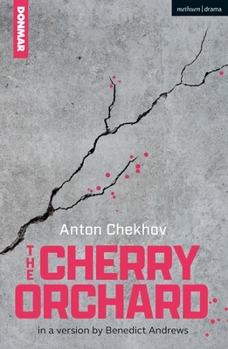The Cherry Orchard
Select Format
Select Condition 
Book Overview
The orchard's white, all white. You haven't forgotten, have you, Lyuba? The avenue lined with trees, unfurling like a slender ribbon. And on moonlit nights, it shimmers. You remember, don't you? You haven't forgotten?
Format:Paperback
Language:English
ISBN:1350501727
ISBN13:9781350501720
Release Date:June 2024
Publisher:Bloomsbury Publishing PLC
Length:88 Pages
Weight:0.20 lbs.
Dimensions:0.2" x 5.1" x 7.8"
Customer Reviews
5 ratings
The winds of change are blowing through this orchard
Published by Thriftbooks.com User , 22 years ago
Anton Chekhov's play "The Cherry Orchard" has been published as part of the Dover Thrift Edition series (that's the version I read before writing this review). No translator is credited for this edition. According to the note at the start of the book, the play was initially presented by the Moscow Art Theatre in 1904.The play takes place on the estate of Madame Ranevsky, the matriarch of an aristocratic Russian family that has fallen on financial hard times. She faces the possible loss of her family's magnificent cherry orchard.The play is populated with interesting characters: Lopakhin, a wealthy neighbor whose father was the serf of Madame Ranevsky's father; Firs, an aged servant who longs for the "old days"; Trophimof, a student with lofty ideas; and more. There is a great deal of conflict among the characters."The Cherry Orchard" is about people dealing with very personal conflicts and crises while larger socioeconomic changes are going on around them. The orchard of the title is a memorable image that is well handled by Chekhov. The play contains some really effective dialogue, such as old Firs' reflection on the apparently lost art of making dried cherries. This is definitely one classic play that remains compelling.
Timeless
Published by Thriftbooks.com User , 22 years ago
The Cherry Orchard was me first experience with Chekhov, and I was surprised at the depth in this 49 page play. By no means would I considered myself a "literary expert," but this was very readable and you can pull a lot of the deeper meanings and its context in Russian history by yourself. I was confused at a couple people who write that the simply couldn't understand it and it put them to sleep! It's not THAT tough! If I could understand and appreciate it, almost anyone can!What I like most about Chekhov is that he doesn't simplify his characters. He's a realist in this sense. Lopahkin and Trophimof each have admirable and detestable characteristics, just like you and I. While it may be set in the tumultuous period prior to the Russian revolution, the ideas and the discussions this play provokes are timeless. Highly recommended!
A classic meditation on fundamental questions of life
Published by Thriftbooks.com User , 24 years ago
"How should one live?" is the fundamental question driving most of Chekhov's work, and it is very overtly laid bare in The Cherry Orchard. Should the aristocratic family in decline stick to owning their cherry orchard (representative of the grandiose trappings of Russian aristocracy), or give in to modern commercialization in order to survive? What is the value of tradition, and how many trees should one own? Chekhov will not answer these questions for you, but he poses them in most interesting ways. In addition to wise insights into such fundamental dilemmas, Chekhov also provides a lot of witty banter, and a great slice-of-life view at 19th century Russian high culture. But this is not just a Russian play or a 19th century play; its themes, questions, and prospective answers are relevant for individuals coping with society and history in any place, and at any time.
Beautiful
Published by Thriftbooks.com User , 24 years ago
I recently saw a production of this and I was moved to tears. Though this play is too sophisticated for many, I found the characters real/alive/and breathing. There is so much one can find in this play, so much to relate to. That is the definition of a classic. Nearly a hundred years later, the characters are just as real, and one can get just as much out of it. And a hundred years later, they still will be. Because certain things never change in humanity. This play covers those things. Another play I recommend would be Thorton Wilder's "The Skin of Our Teeth" which is another genius play commenting on society.
An effective allegory
Published by Thriftbooks.com User , 26 years ago
With Chekhov providing so many characters as symbols of both political beliefs and separate generations, this play is an effective allegory of the Bolshevik revolution in Russia. In reading the play as an allegory, it is undoubtedly a comedy.





